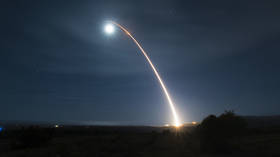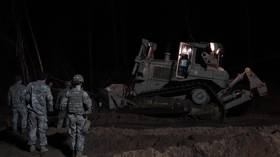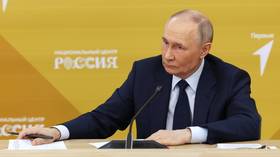What pandemic? US spent more on nuclear weapons development in 2020 than rest of world combined, report says

The United States accounted for over half of the total nuclear weapons spending in 2020. The $37.4 billion that went toward its nuclear arsenal beat the combined expenditure of the eight other nuclear powers, a new report says.
The majority of that whopping sum, roughly 5% of the country’s total military spending last year, was disbursed as defense contracts to private corporations. Nearly a third, around $13.7 billion, was awarded to contractor Northrop Grumman, which is building a new intercontinental nuclear weapons system.
According to the report, titled ‘Complicit: 2020 Global Nuclear Spending’ and published on Monday by advocacy group International Campaign to Abolish Nuclear Weapons (ICAN), nuclear-armed countries collectively spent $72.6 billion on these weapons last year – an uptick of $1.4 billion on the previous year.
The US spent more than three times the figure dished out by its closest competitor, China ($10.1 billion). Russia was listed in third place at $8 billion, while the UK spent around $6.2 billion, the report said.
The ICAB report calculated that nuclear-armed states, which also include France, India, Israel, Pakistan, and North Korea, together spent more than $137,000 per minute on atomic weapons as the pandemic raged in 2020.
“There’s always more (nuclear spending) out there... even more still lurking in the shadows,” Susi Snyder, managing director of the project ‘Don’t Bank on the Bomb’ and co-author of the report, told The Intercept. Snyder told the outlet that “governments, especially US, UK, (and) France are always demanding ‘transparency’... yet they do not hold themselves to the standards they demand of others.”
US @StateDept budget testimony yesterday, asks $10 billion for global health. That’s less than 1/3 of what the US spent on #NuclearWeapons last year. https://t.co/dXqrodXO2J. #nuclearban
— Susi Snyder (@susisnyder) June 8, 2021
More than 20 nuclear weapon developers were found to have profited from existing or new contracts – with 11 Western companies bringing in $27.7 billion in new or modified nuclear-weapons contracts by themselves, the report notes.
Behind Northrop Grumman on this leader board were fellow American firms General Dynamics ($10.8 billion), Lockheed Martin ($2.1 billion), Raytheon Technologies ($450 million) and Charles Stark Draper Laboratory ($342.3 million).
The report also lays bare the realities of this spending cycle which sees governments increasingly channel public money into nuclear contracts. Weapons manufacturers in turn spend increasingly larger amounts on lobbying policy makers – to the tune of nearly $100 million last year – to help nudge budgeting officials towards raising the expenditure.
For every dollar spent last year lobbying governments to raise spending on defense, $236 came back to companies in nuclear weapons contracts, the report states.
Also on rt.com Caitlin Johnstone: US corporate media wastes no time using UFO report to promote arms raceCompanies even lobbied to authorize defense funding in Covid-19 relief bills. For instance, the report notes that much of Boeing’s defense lobbying activities were bundled in with lobbying around the US’ $2.2 trillion CARES (the Coronavirus Aid, Relief, and Economic Security Act) economic stimulus plan.
In addition, between $5-10 million was collectively dished out last year to a number of prominent think tanks, some of which published reports that recommended bolstering nuclear capabilities.
The report highlighted, for instance, that the Atlantic Council, which received upwards of $1.7 million in 2019, “published an issue brief which recommended the US proceed to develop new ‘low-yield’ nuclear capabilities to deter Russia.”
According to the ICAN report, Northrop spent $13.3 million in lobbying US policymakers and at least another $2.0 million funding nine major think tanks, including the Atlantic Council, the Brookings Institution, the Center for a New American Security, and the Center for Strategic and International Studies.
The contract for the ‘Ground Based Strategic Deterrent’ (GBSD) ballistic missile system, awarded to Northrop Grumman last year, is reportedly expected to be worth an estimated $85 billion over the program’s lifetime. In a March 2020 teleconference with reporters, Will Roper, the Air Force’s assistant secretary for acquisition, said despite the pandemic, there were “no major delays” to Air Force weapons development programs.
Rather than adopting an “all-hands approach to helping millions of Covid-19 patients survive or donating profits to medical charities,” the report notes that these firms spent “money to persuade policy makers to sustain the nuclear weapons industry, and to line their own pockets for years to come.”
Also on rt.com Blinken claims Iran’s nuclear bomb ‘breakout time’ may soon be a ‘matter of weeks’, with talks held hostage to US sanctionsLike this story? Share it with a friend!














